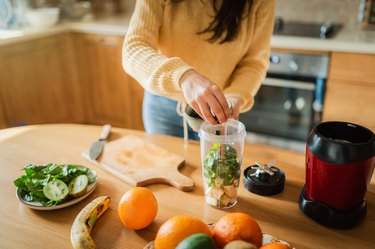
Periods can be a pain, so anything that can ease that monthly "meh" feeling can come as a relief. But can vitamin C affect your period?
Alas, getting more of the nutrient might not have much of an effect, despite rumors that high levels can affect your hormones. Instead, staying active and eating a balanced diet of nutritious whole foods is your best bet.
Video of the Day
Video of the Day
Here's everything you need to know about whether vitamin C can affect your period, including answers to your FAQs about vitamin C and periods.
Can Vitamin C Start Your Period?
Rumor has it that taking vitamin C for periods can affect your hormones and even make your period come sooner.
But the evidence on this comes mainly from animals, with limited relevance to humans. For example, an October 2012 study in the Journal of Clinical Gynecology & Obstetrics found that rabbits given high levels of vitamin C had an increase in estrogen and a decrease in progesterone levels in their womb tissue.
"This has translated into a common myth that large amounts of vitamin C can 'induce' bleeding by changing the ratio of estrogen to progesterone," says New Orleans-based Maria Sylvester Terry, RDN, dietitian for Ochsner Health's Eat Fit NOLA program.
While there's no strong basis for the claim that vitamin C does affect your period cycle, she says if you're curious about upping your intake of vitamin C, you should choose food sources (more on that in a moment).
Here's why: High-dose supplements can cause digestive issues, and if you're taking birth control pills or hormone replacement therapy, vitamin C could increase your estrogen levels too much, according to the Mayo Clinic.
How Much Vitamin C Should You Get?
Per the 2020-2025 Dietary Guidelines for Americans, adults should aim to eat the following dose of the vitamin every day:
- People assigned female at birth: 75 mg
- People assigned male at birth: 90 mg
Does Vitamin C Help With Your Period?
Even though vitamin C can't start your period, making sure you eat vitamin C-rich foods is a great choice while you're menstruating.
That's because vitamin C helps your body absorb iron, according to the Office of Dietary Supplements, and getting enough iron can be a challenge for people with heavy periods. Opt for produce like:
- Bell peppers
- Kale
- Brussels sprouts
- Spinach
- Kiwi
- Guava
- Strawberries
- Oranges
Does Vitamin C Help Irregular Periods?
There's no evidence to suggest that taking vitamin C during your period can help you regulate an irregular cycle.
Does Vitamin C Stop or Delay Your Period?
Perhaps you've heard rumors that vitamin C can stop or delay your period. But there's no scientific evidence to back up these claims, so taking vitamin C to stop your period won't be effective, no matter how much you take.
Instead, eating plenty of the nutrient can support overall wellness. In addition to helping your body absorb iron, the vitamin also protects your cells against damage, helps build healthy tissue and supports the healing process, per the Mayo Clinic.
If you notice your period stops after eating vitamin C, that's likely a coincidence. If your period stops unexpectedly, your best bet is to check in with your doctor about whether you may be pregnant or if an underlying hormone issue is to blame, per the Ohio State University's Wexner Medical Center.
Does Vitamin C Make Your Period Shorter?
Similarly, there's no research that supports the claim that vitamin C shortens your cycle.
Other Vitamins for a Healthy Cycle
Magnesium, zinc, iron, B complex vitamins and omega-3 fats are all linked to fewer period problems and PMS symptoms, Sylvester Terry says.
You can get these from a balanced diet that contains foods such as:
- Whole grains
- Beans
- Lentils
- Peas
- Green vegetables
- Low-fat dairy
- Fatty fish
- Lean meat
However, going mostly plant-based is probably best. An August 2018 study in PLOS One suggests an association between eating meat and having more painful periods. There was also a link between drinking soda and painful period cramps, so you may want to skip the carbonated drinks, too.
What About Pineapple or Herbs?
Another rumor: Pineapple can prompt a period or even induce labor because it contains the bromelain enzyme. But there's no research to back this up. “Neither canned nor fresh pineapple contain enough bromelain to induce labor or a period,” Sylvester Terry says.
However, some medicinal herbs may affect menstruation. A March 2018 review of small human studies in BioMed Research International found that five traditional herbs may help regulate infrequent or missed periods:
- Foeniculum vulgare (fennel)
- Mentha longifolia (wild mint)
- Paeonia lactiflora (Chinese peony)
- Sesamum indicum L. (sesame)
- Vitex agnus-castus (chaste tree)
The researchers call for more rigorous research before drawing any firm conclusions, though. What's more, these supplements aren't regulated by the FDA, so talk to your doctor before trying any herbal products.
- Journal of Clinical Gynecology & Obstetrics: “The Effects of Ascorbic Acid on the Estrogen/Progesterone Levels in the Isolated Rabbit Uterine Muscle”
- Mayo Clinic: “Vitamin C”
- Office of Dietary Supplements: “Iron”
- BioMed Research International: “Herbal Medicine for Oligomenorrhea and Amenorrhea: A Systematic Review of Ancient and Conventional Medicine”
- U.S. Food & Drug Administration: “FDA 101: Dietary Supplements”
- PLOS ONE: “Lifestyle and Prevalence of Dysmenorrhea Among Spanish Female University Students”
- U.S. Department of Agriculture and U.S. Department of Health and Human Services: "2020-2025 Dietary Guidelines for Americans"
- Ohio State University's Wexner Medical Center: "Is it normal to miss periods?"
Is this an emergency? If you are experiencing serious medical symptoms, please see the National Library of Medicine’s list of signs you need emergency medical attention or call 911.